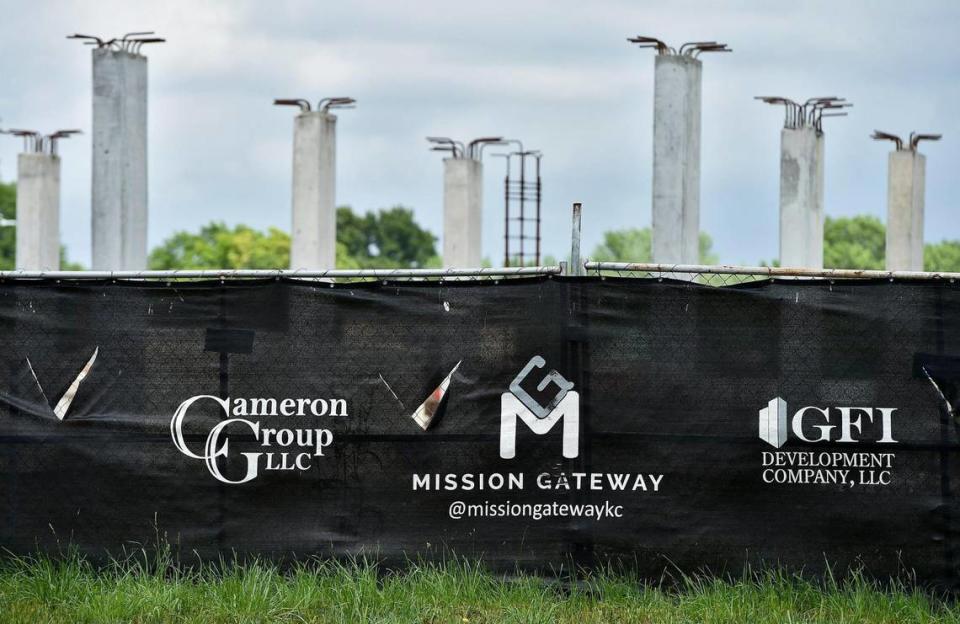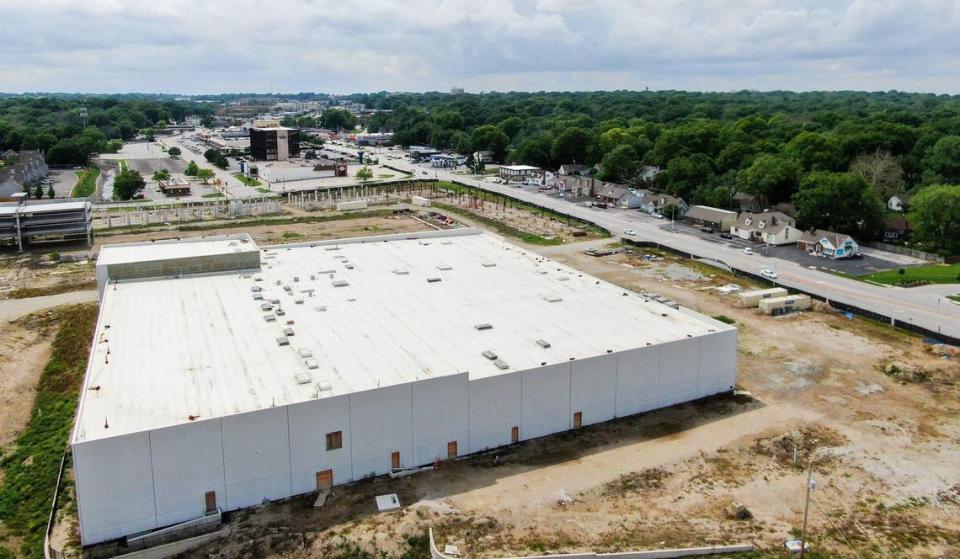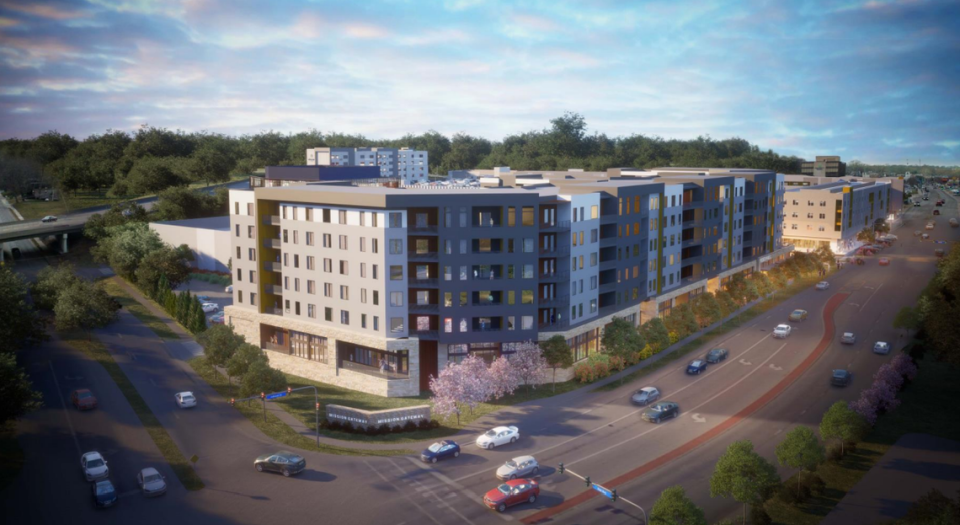After years of broken promises and setbacks, bank sues to foreclose on Mission Gateway
Months after city officials gave the developer behind the ill-fated Mission Gateway project another chance, the project is now facing possible foreclosure.
New York-based Metropolitan Commercial Bank sued Aryeh Realty LLC, a subsidiary of the firm that owns the property, alleging it is delinquent on more than $1 million in mortgage payments.
It’s the latest obstacle for a project that has dogged city officials for years. The site of the former Mission Mall, it’s long been considered among the most prime sites for redevelopment in Johnson County.
But the Cameron Group, a New York development firm run by Tom Valenti, has faced nearly 20 years of setbacks since buying the property in 2005. Those include delinquent property taxes, contractors who have gone unpaid and multiple iterations of development plans for the site that have never come to fruition.
The property currently sits in a state of suspended animation: Support pillars rise from the ground, but hold nothing up. The bones of a bright white structure were erected, but the unfinished skeleton was abandoned years ago as construction stalled during the pandemic.

“We were disappointed to learn that our lender took the drastic step of instituting a foreclosure action shortly after the Mission City Council’s approval of a new redevelopment agreement for the project,” Andy Ashwal, of GFI Development, said in an email. “We will continue to work with all stakeholders involved and look forward to delivering a completed Mission Gateway project.”
Over the years, city and county officials have grown frustrated with the development, though they say they have little power over the privately controlled property.
“Another chapter in the saga,” Johnson County Commission Chairman Mike Kelly told The Star on Monday.
Formerly the mayor of nearby Roeland Park, Kelly said developing the valuable Mission Gateway property has long been a priority of city and county leaders.
“And I think everybody is disappointed, including the developer, that there hasn’t been more development on that property in well over a decade,” Kelly said. “I have great confidence in the city of Mission, staff and elected officials that they will do everything reasonable to make that project a success. But at the end of the day, they have to look out for the taxpayers and city.”
Court records indicate that Mission Gateway’s developers have struggled with mortgage payments for months.
Metropolitan Commercial Bank in 2019 issued a $20 million mortgage loan to Aryeh Realty on the property. The principal amount was increased to $26 million in a January 2020 modification of the loan agreement.
The original mortgage has been amended several times and the bank entered into a forbearance agreement, which can allow a reduction or pause in payments for struggling borrowers, with Aryeh in September 2020.
In a lawsuit filed last week in Johnson County Court, the bank alleged that Aryeh owed $1.189 million in delinquent principal and interest payments dating back to November 2022. The bank demanded immediate repayment of the entire loan or foreclosure and sale of the property.
The lawsuit names multiple other parties as defendants, mostly vendors and contractors who hold liens on the project after the developer failed to pay construction bills in 2020.
Once the property is sold, the bank asks the courts to direct proceeds to pay off back taxes, repay the mortgage and reimburse unpaid vendors — if enough proceeds are available.
Valenti’s partner in Mission Gateway is Allen Gross, CEO of New York City real estate finance and management firm GFI Capital Resources Group. The bank says its loan was guaranteed by Gross, who was required to maintain a net worth of $100 million and have $15 million in liquid assets.
The bank says it notified Gross and Aryeh of their default in February, but received no response.

Mission Mayor Sollie Flora said during last week’s council meeting that the city is aware of the foreclosure litigation.
“The city is not a party to the action, but we are closely monitoring the litigation and will take appropriate action if and when it is necessary to protect the interests of the City in relationship to the Gateway Project,” Flora said.
City officials said in a statement Monday that while the City Council approved a new development agreement in January, the developer has not received any tax incentives yet.
“The foreclosure action does not negate any current or future taxes or special assessments due to the City,” officials said. “The City will continue to assess its rights under the redevelopment agreement.”
Councilwoman Debbie Kring said she learned of the litigation with the rest of the council last week, but “it’s a wash in terms of what’s going on. We’ve been working on this for so long, since 2005.
“I’ve worked on this since the very beginning. And whatever happens outside the realm of us getting a decent development will be really sad for the community.”
More challenges for Mission Gateway
While she was running for mayor in 2021, then-Councilwoman Flora expressed dismay over Valenti’s repeated setbacks.
“At this point, with the latest notice of default, the latest delays and lack of communication, it’s pretty clear to me now the developer can’t get it done,” Flora told The Star at the time. “Ideally, I’d like to see the developer move on, sell the project and let us deal with someone who is committed to being a trustworthy partner.”
But feeling as if the city had armed itself with enough protections in case the project fails again, Flora and the majority of council members pushed ahead with a new redevelopment agreement in January.
All but one City Council member approved the agreement — the fifth iteration of the plan still being forged after years of false starts and broken promises.
Plans for the $268 million project, at Shawnee Mission Parkway, Johnson Drive and Roe Avenue, included a 90,000-square-foot Cinergy Entertainment complex with 10 movie theaters, a bowling alley, zip lines and more. The first phase of work included 50,000 square feet of commercial or restaurant space, 370 apartment units and a parking garage.

Cinergy had recently been working with the development team, but is “very disappointed that the project has hit another snag,” said Traci Hoey, that company’s vice president of marketing.
“Cinergy continues to be excited about this community, and we’d love nothing more than being able to open a state-of-the-art cinema entertainment center in Mission,” Hoey wrote in a Monday email.
The second phase of the project would feature a 200-room hotel and 100,000 square feet of office space or a medical facility at the former Mission Mall site.
The previous agreement with the city expired at the end of 2021 when the developer missed a critical deadline requiring construction to be substantially completed — a goal he was never close to meeting.
In 2019, the city was moving forward with the issuance of special obligation bonds for the project. And the developer used private equity to begin construction on the site. But shortly after, one of its lenders withdrew support. And then COVID hit.
Construction came to a halt, leaving the highly visible site in limbo. Developers previously said that structural engineers evaluated the state of the unfinished structures, including the exposed parking garage, on the site last spring and did not have significant concerns. They promised a new evaluation prior to the issuance of a building permit.
Contractors then filed at least a dozen liens against the developer claiming they were not paid for their work. Later in 2020, the developer was in default after failing to pay hundreds of thousands of dollars in property taxes.
What is the future for Mission Gateway?
Last year, Valenti once again asked the council to consider extending tax incentives for the project. The city’s top financial adviser said last fall he did not yet have the confidence to move forward until the developer proves it has secured enough financing.
But as more details came into focus in the coming months, financial advisers said they had more confidence in the developer’s financing. In November, the council approved a preliminary development plan and extended an expiration date for industrial revenue bonds.
Bruce Kimmel, the city’s financial adviser, said the developer had obtained updated loan sheets and was negotiating the terms. The developer indicated that talks were ongoing with equity investors, and Kimmel felt that by January, letters of interest would be secured.
The first phase of work was estimated to cost $174 million. Financial advisers in January said the developer needed $29 million more to fully fund that phase, and that the developer had obtained at least three letters indicating equity partners’ interest in the project.
The mayor asked for clarification that commercial lenders feel confident in the developer’s equity, and Kimmel responded he believed that was the case, according to city documents. Kimmel said the city had received as much financial information as possible from the developer and felt they had received adequate assurances.
Developers told the council they were confident they had the relationships in place to secure the funding.
During that January meeting, the council agreed to terminate the former development agreement and approved a new one. It revised the terms of a 20-year tax increment financing deal and raised the special sales tax collected as part of a 22-year community improvement district from 1% to 2%.
The new agreement required the first phase to be completed within 46 months after bonds are issued, or else the deal dies. It also required satisfaction of all liens at bond closing.
Officials also felt comfortable that the new agreement protects the city by requiring the developer to place $3 million in escrow. Of that, $2 million would be used to ensure taxes are paid on the project and $1 million would ensure deadlines are met. If not, the funds would be forfeited to the city.
Officials determined the developer needed city participation for the project to be financially viable, and argued that it is unlikely a different developer would build on the site without tax incentives.
City leaders estimated Mission would receive $20 million from the project’s first phase over the next 20 years.
Locals are now left to wonder about the fate of the project — again.
“I get asked about that probably weekly,” said Jennifer Bricker-Pugh, who owns LuLu’s Boutique in downtown Mission. “We don’t really know what’s going on.”
The site has been an “eyesore” for years, Bricker-Pugh said.
Local residents and business owners were optimistic that construction would begin anew after the January agreement with the city. But now it’s unclear who will control the property if the bank forecloses and what new owners may have planned.
At one point, developers considered building a Walmart Superstore on the site — a plan that was unpopular with city officials and Mission residents. Bricker-Pugh said most locals hope the next iteration of the project remains focused on supporting small and unique businesses.
“I think the fear is that something like a chain will come in and that is absolutely not what anybody wants,” she said. “So this could be a positive but it also brings up more questions.”

